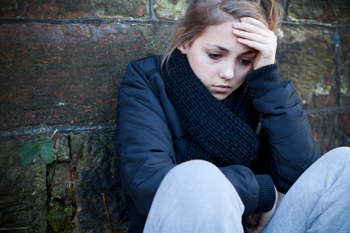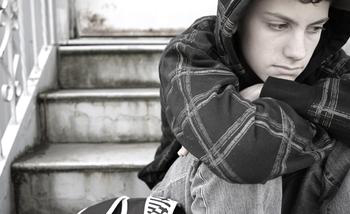Depression
Depression is more than just a low mood - it's a serious illness. While we all feel sad, moody or low from time to time, some people experience these feelings intensely, for long periods of time and often without reason. People with depression find it hard to function every day and may be reluctant to participate in activities they once enjoyed.
Depression is one of the most common of all mental health problems. One in five people experience depression at some stage of their lives.

Anxiety Disorders
Anxiety disorders are a group of psychiatric or psychological disorders. They include generalised anxiety disorders, social phobias, specific phobias – for example, agoraphobia and claustrophobia – panic disorders, obsessive compulsive disorder (OCD) and post traumatic stress disorder. Untreated anxiety disorders can lead to depression.
Anxiety disorders are common mental health problems that affect many people. Approximately 25 per cent of the population have an anxiety disorder that warrants treatment at some time in their life and up to another 25 per cent have less severe anxieties such as fears of spider and snakes.
Not all anxiety is a disorder
Everyone experiences anxiety and fear at times; they are normal and helpful human emotions that help us deal with danger. However, some people experience excessive and irrational anxiety, and worries that become ongoing and distressing and that interfere with their daily lives. This may indicate an anxiety disorder. Often there appears to be no obvious or logical reason for the way the person feels. This may make an anxiety disorder even more worrying to the sufferer.
Symptoms of anxiety disorders
The main features of an anxiety disorder are fears or thoughts that are chronic (constant) and distressing and that interfere with daily living. Other symptoms of an anxiety disorder may include:
- Panic or anxiety attacks or a fear of these attacks
- Physical anxiety reactions – for example trembling, sweating, faintness, rapid heartbeat, difficulties breathing or nausea
- Avoidance behaviour – a person may go to extreme lengths to avoid a situation that they think could bring on anxiety or panic.
Panic attacks are a common symptom
A panic attack is a sudden feeling of intense terror that may occur in certain situations or for no apparent reason. A panic attack does not mean a person is necessarily suffering an anxiety disorder. However, a panic attack is a common feature of each type of anxiety disorder. Symptoms of a panic attack may include:
- Shortness of breath
- Dizziness
- Rapid heartbeat
- Choking
- Nausea.
The cause of panic attacks is unknown but they may be related to a chemical response in the brain, caused by actual threatening or stressful events or by thinking about stressful events. The brain response leads to physiological changes in the body, such as shallow breathing and rapid heartbeat.
Panic attacks can be frightening. Some people say they feel like they are going to die or go crazy. People affected by panic attacks may avoid situations in which they think attacks might occur. In some cases, this may lead to the development of other anxiety disorders including agoraphobia.

Types of anxiety disorders
Anxiety becomes a disorder when it is irrational, excessive, too persistent and attached to situations that do not warrant it and when it interferes with the person’s daily life. Anxiety disorders include:
- Generalised anxiety disorder
- Social phobias – fear of social situations
- Specific phobias – for example a fear of open spaces (agoraphobia) or enclosed spaces (claustrophobia)
- Panic disorders – frequent and debilitating panic attacks
- Obsessive compulsive disorder
- Post traumatic stress disorder.
Generalised anxiety disorder
Generalised anxiety is excessive anxiety and worry about common issues. The focus of the anxiety might be family or friends, health, work, money or forgetting important appointments. A person may be diagnosed with a generalised anxiety disorder if:
- The anxiety and worry has been present most days over a six-month period
- The person finds it difficult to control their anxiety.
Social phobias
People with social phobia are afraid of being negatively judged or evaluated by others. This leads to fear of doing something that may humiliate them in public – for example public speaking, using public toilets, eating and drinking in public, writing in public, or any social encounters such as parties or workplaces.
Some social phobia sufferers may only fear one type of situation. Others may be concerned about several types of situations. This can lead them to avoid the feared situations, which can lead to severe isolation.
Specific phobias
A person with a specific phobia has a persistent and irrational fear of a particular object or situation. They may fear animals, places or people. Fear of the object or situation is so severe that a person may experience physical symptoms and panic attacks. Fears may include dogs, blood, storms, spiders or other objects or situations but, in all cases, the anxiety is both excessive and interfering.
The adult phobia sufferer usually knows that their fear is excessive or unreasonable. However, their need to avoid the object, place or person can significantly restrict their life.
Panic disorders
Panic or anxiety attacks are common. Panic disorders are less common; they affect about two per cent of the population. For a person to be diagnosed with a panic disorder, they would usually have had at least four panic attacks each month over an extended period of time. Often panic attacks may not be related to a situation but come on spontaneously.
Panic disorder may be diagnosed if panic attacks are frequent and if there is a strong and persistent fear of another attack occurring.
Obsessive compulsive disorder
People with obsessive compulsive disorder (OCD) have intrusive, unwanted and involuntary thoughts or impulses (obsessions). They also feel compelled to perform behavioural and mental rituals (compulsions) such as excessive handwashing, showering or checking. They are usually aware of the irrational and excessive nature of their behaviour.
Post traumatic stress disorder
Post traumatic stress disorder develops after someone is exposed to an extremely traumatic event. The event may be recent, such as a car accident or physical assault, or it may have occurred in the past, such as childhood sexual assault.
Reactions of grief, shock and anger are normal after traumatic events. However, people with post traumatic stress disorder experience severe, prolonged and intrusive reactions that dramatically affect their daily life. These may include intrusive thoughts or images of the traumatic situation that are as distressing, or more distressing, than the original event. Often people begin to avoid reminders of the trauma, including places or similar situations.
Anxiety disorders can have serious effects
An anxiety disorder may lead to social isolation and clinical depression, and can impair a person’s ability to work, study and do routine activities. It may also hurt relationships with friends, family and colleagues. Depression can be a serious illness with a high risk of self-harm and suicide.
Recovery is possible with treatment
Recovery from an anxiety disorder is possible with the right treatment and support. Effective treatments for anxiety disorders may include:
- Cognitive behavioural therapy – aims to change patterns of thinking, beliefs and behaviours that may trigger anxiety. Part of the therapy may involve gradually exposing a person to situations that trigger anxiety: this is called desensitisation.
- Anxiety management and relaxation techniques – for example hypnotherapy, meditation, breathing exercises and counselling.
- Medication – this may include antidepressants and tranquillisers.
Where can I get help?
- Your doctor
If you have any concerns please come and see one of our Brisbane Doctors for the best advice
To Book an appointment please call 07 3351 8593 or book an appointment online.

